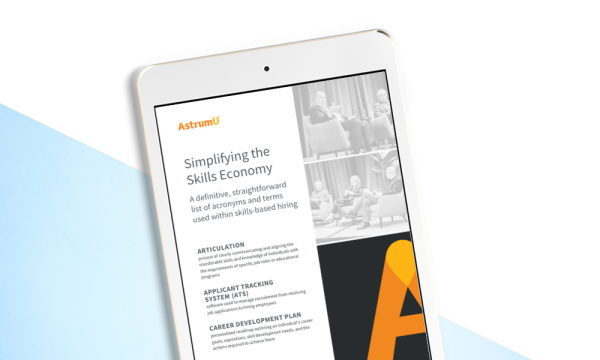The Biden administration’s recent announcement of a student loan forgiveness plan is the latest salvo in the long-running battle to determine if college is worth the expense. There are strong arguments on both sides. On one hand, a college degree can boost a person’s lifetime earnings significantly. On the other, a college degree can also fail to pay off and leave someone with a lifetime of debt.
Increasingly, some corners of the corporate world are siding with the no-degree-needed faction and eliminating degree requirements for jobs across their companies. But simply doing away with degree requirements won’t settle this debate. Higher education, for all its faults and expense, is still a worthwhile pursuit that promotes social and economic mobility. It’s also likely that college degrees could remain the default option for learners and hiring managers across multiple occupations, if for no other reason than a lack of understanding of an individual’s capabilities.
But a college degree is, in many respects, an imperfect tool for signaling a person’s capabilities, let alone their long-term potential in the professional world. Employers are often left to do guesswork on a candidate’s fitness for a role based on simplistic measures like standardized test scores, concentrations or majors, and transcripts. To fix this, higher education can rise to the challenge of defining and demonstrating the value of the college experience and quantifying the skills and abilities their graduates possess.
Higher education has traditionally been overly dependent on outdated proxies—test scores, transcripts, majors and minors—to measure both learning and potential. But rather than reveal talent, these archaic measures tend to conceal it.
There are fresh signs that employers may be more open to moving away from degree requirements altogether. A recent study commissioned by nonprofits American Student Assistance and Jobs for the Future found that 72% of companies believe college degrees are unreliable signifiers of a person’s job-related skills and abilities and that 68% want to hire people who don’t have college degrees. Generation Z—young Americans born after 1996—agrees with them. Nearly 60% said companies should hire high school graduates who have followed non-degree pathways.
Meanwhile, most industries almost always hire for specific technical abilities rather than harder-to-measure soft skills and knowledge, like communication and problem-solving. Yet, many of the most successful executives in the technology industry have humanities backgrounds—a list that includes YouTube CEO Susan Wojcicki, Slack CEO Stewart Butterfield and Alibaba founder Jack Ma. However, we may not know exactly how their college experiences led to these leadership roles. Likewise, fewer than half of recent college graduates actually find careers directly connected to their major or area of study.
Understanding why these connections—and disconnects—exist is crucial so that colleges and employers can start to close such knowledge gaps. Colleges must better quantify and understand the skills associated with their degree programs, both technical and universal, and leverage these data-driven insights to illuminate the most effective pathways students can take from education to high-impact employment. They also must share this information with employers so companies can better comprehend and utilize the talents of new college graduates.
Two decades ago, such a task would have been nearly impossible to accomplish. However, today’s colleges and universities have access to more than enough data to make this goal a reality. Organizations like QA Commons are creating new employability frameworks to help institutions parse the mountains of student data and more fully understand how they correlate to potential in the workforce. Education Design Lab is working with colleges, universities and employers to create earn-and-learn degrees and stackable micro-credentials with pathways that lead directly to employment. The key to both of these efforts is that skills are both understood, articulated and transparently communicated to learners and their future employers alike.
The technology to more easily connect this data to what students are learning—and to connect companies directly with potential employees—is also emerging. Advances in machine learning could help institutions accurately forecast the labor market value of the educational experiences they provide. This could equip students, advisors and faculty with important information on how those experiences can translate to quantifiable and marketable skills.
Despite signs of waning confidence in higher education, college remains an immensely valuable experience. Today’s world of work is a complicated, ever-evolving place that requires institutions to find ways to translate the full breadth of their students’ time on campus into a language that allows employers to better understand and apply the value being created through the educational experience. To do so requires them to understand and share all skills, experiences and knowledge, from the actual content of courses to intangible skills such as collaboration and problem-solving, that their students have mastered. Otherwise, we risk having too many college graduates—and colleges themselves—getting left behind.
/ Adam Wray, Founder & CEO
Originally published on Forbes.com
